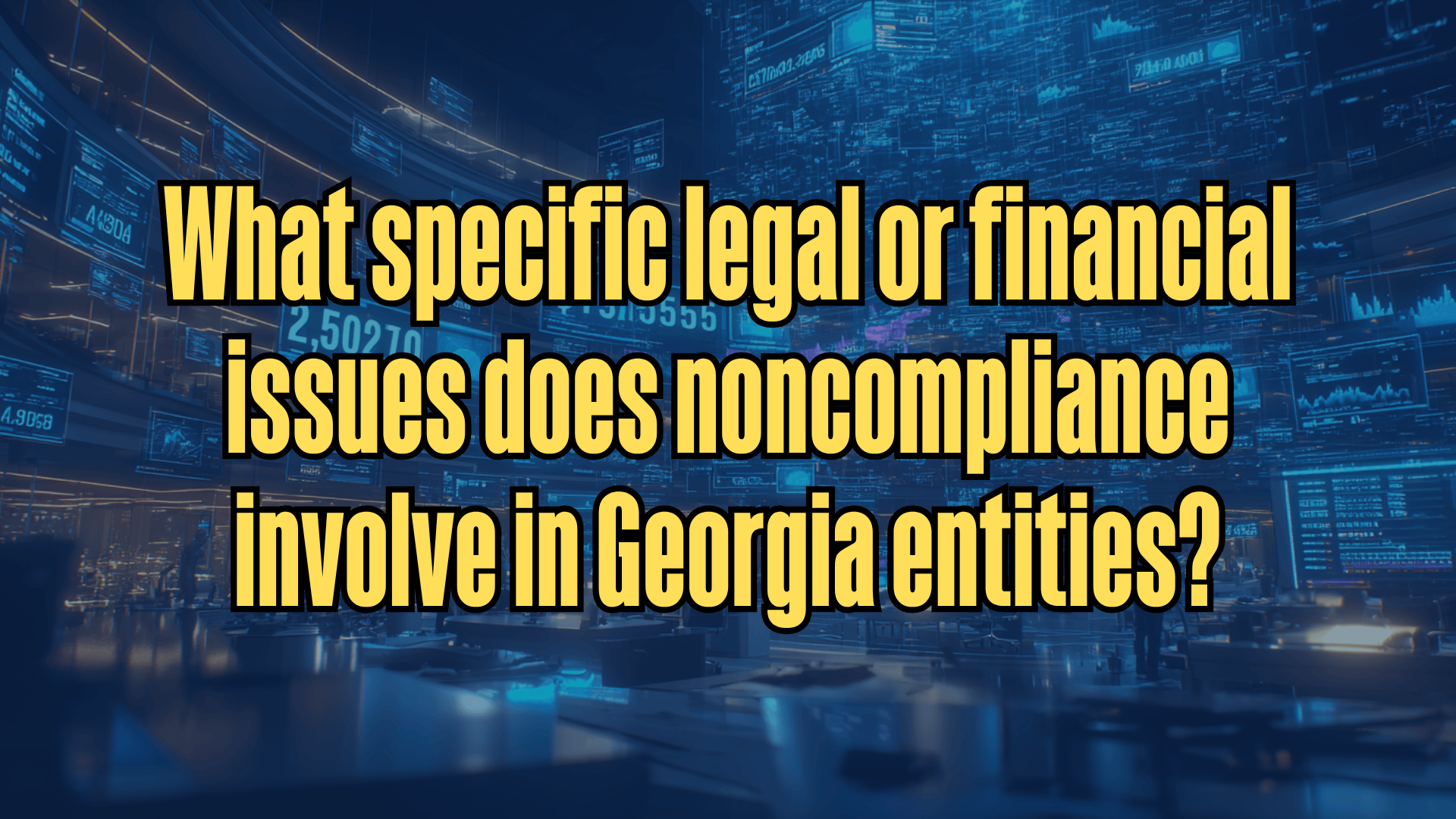While a "fully active" status, often denoted as "Active/Compliance", signifies a business operating in full adherence to state regulations, any deviation from this ideal – particularly a state of noncompliance – introduces significant legal and financial vulnerabilities into your lending portfolio.
Let's dissect the specific legal and financial issues that noncompliance involves for Georgia entities, distinguishing them from the stability of a fully active status.
The Benchmark: "Active/Compliance" Status in Georgia
To truly grasp the risks of noncompliance, it's vital to first understand the gold standard. In Georgia, an "Active/Compliance" status means the business entity is currently operational and in full compliance with all state regulations, including necessary filings and fee payments.
- Stability Indication: This status serves as a strong signal of organizational health, indicating the business responsibly manages its legal obligations.
- Reduced Lending Risk: For lenders, this translates to a lower risk profile, suggesting better creditworthiness and stability. This reliability supports more confident, expedited underwriting.
- Streamlined Processes: Businesses in full compliance typically present clear, verifiable records, facilitating smoother automated underwriting processes powered by real-time Secretary of State (SOS) data. This efficiency directly translates to faster loan approvals and improved customer satisfaction.
The Red Flags: Specific Legal & Financial Issues of Noncompliance in Georgia
In stark contrast, any form of "noncompliance" in Georgia signals a deviation from this ideal, introducing distinct legal and financial issues that alternative lenders must scrutinize. These statuses often represent different stages or severities of a business's failure to meet its statutory duties.
1. "Active/Noncompliance": Operational Yet Vulnerable
This status directly addresses your query, indicating an entity that is operational but not fully compliant with state requirements, thus putting its good standing at risk. While still generating revenue, this is a precarious position.
- Implicit Management or Financial Issues: This status suggests underlying management disorganization or burgeoning financial difficulties that could easily escalate. Lenders should view this as a clear indicator that the business may be struggling to keep its house in order.
- Heightened Future Legal Exposure: The "at risk" component implies that without rectification, the entity could face more severe penalties, such as administrative dissolution or revocation of its legal authority to operate. This directly impacts the enforceability of contracts and the overall legal standing of your borrower.
- Increased Due Diligence Imperative: For lenders, this status demands a deeper dive into the specific nature of the noncompliance. Understanding why the business is non-compliant (e.g., missed filings, unpaid taxes) is crucial to assess the true depth of its instability and potential impact on loan repayment capacity.
2. "Noncompliance/Nonpayment": Financial Distress Signaled
This status explicitly highlights a failure to comply with requirements, specifically due to unpaid fees or unfiled necessary documents. This is a potent red flag for financial health.
- Direct Financial Strain Indicator: A business unable to meet basic state fee payments or filing requirements is likely experiencing cash flow problems or severe financial mismanagement. This signals that the borrower may already be under significant financial duress, directly affecting their ability to meet loan obligations.
- Escalated Risk of Regulatory Action: Continued "Noncompliance/Nonpayment" will inevitably lead to more severe state interventions, such as administrative dissolution or revocation. This means the business's legal ability to operate, contract, and generate revenue will be severely compromised, jeopardizing your loan's security.
- Impact on Loan Terms and Approval: For lenders, encountering this status means a significantly higher default probability. It necessitates a more conservative approach to lending, potentially leading to higher interest rates, stricter collateral requirements, or outright denial, as the core operational integrity of the business is questionable.
3. "Admin. Dissolved": State-Imposed Termination
This status indicates that the entity has been administratively dissolved by the state due to a failure to meet legal obligations, such as filing required reports or paying fees.
- Loss of Legal Standing: An administratively dissolved entity effectively ceases to exist as a legal operating entity. This means it cannot legally enter into new contracts, enforce existing ones, or conduct normal business transactions, rendering any loan to such an entity highly precarious.
- Severe Financial Distress or Management Neglect: This is a consequence of persistent non-compliance, strongly suggesting deep-seated financial difficulties or chronic managerial neglect. Your ability to recover funds from a business that cannot legally operate is severely diminished.
- Complication of Collateral and Repayment: Recovery of collateral or enforcement of repayment becomes incredibly challenging, as the legal entity you lent to may no longer legally exist or have the capacity to engage in financial transactions. This status presents an exceptionally high risk for lenders, with little to no possibility of repayment.
4. "Revoked": Direct Sanction for Non-Compliance
A "Revoked" status means the entity's registration has been revoked by the state, often due to serious or repeated non-compliance. This is a definitive action by the state.
- Prohibition from Legal Operation: A revoked entity is no longer legally allowed to operate in Georgia. This is a critical legal impediment that immediately impacts its revenue generation and ability to service debt.
- Indication of Egregious Issues: This status typically arises from more severe or persistent failures to comply than simple "nonpayment," highlighting significant and unaddressed legal or financial problems within the organization. This signals a profound lack of commitment to legal and operational standards.
- Unsuitability for Lending: Lenders should unequivocally avoid extending credit to revoked entities, as they fundamentally lack the legal standing and operational capacity to repay loans. Any existing loans would require immediate and aggressive intervention.
5. "Expired": Lapse of Authorization
An "Expired" status indicates that the entity's registration or reserved name has lapsed due to non-renewal. While sometimes rectifiable, it signals potential issues.
- Loss of Operational Authority: An expired entity is no longer authorized to conduct business in Georgia unless renewed. This directly impacts its legal right to operate and generate income.
- Warning of Operational Instability or Financial Constraints: The failure to renew, even if an oversight, can suggest a lack of administrative diligence or, more seriously, financial constraints that prevent routine compliance. This creates an uncertain future for the business's operational continuity.
- Requirement for Thorough Due Diligence: Lenders must conduct exceptionally thorough due diligence to understand the reasons for the lapse and the business's plans for reinstatement, if any, before considering any lending. Without clear, verifiable plans for rectification, the risk remains high.
6. "Inactive": Dormancy and Absence of Revenue
An "Inactive" status means the entity is not currently operational but has not been formally dissolved; it may be in a dormant state.
- Lack of Current Revenue Streams: An inactive business typically lacks current revenue streams or assets being actively used to generate income. This poses a direct challenge to loan repayment, as the fundamental source of funds is absent.
- Uncertainty of Future Viability: While not formally dissolved, "inactive" status introduces significant uncertainty regarding the business's future operations and financial health. It might be a temporary pause or a prelude to full cessation.
- Increased Lending Risk Due to Absence of Activity: Lenders should be wary, as lending to an inactive entity inherently carries higher risk due to the absence of active operations and verifiable financial activity necessary for consistent repayment.
7. "Terminated": Definitive End of Legal Existence
A "Terminated" status signifies that the entity has been formally dissolved, either voluntarily or by state action, and is no longer in existence.
- Complete Cessation of Legal Standing: This is the most definitive status for a non-existent entity. A terminated business has no legal standing to operate or enter into new financial agreements.
- No Capacity for Repayment: Since the entity no longer exists, it has no capacity to generate revenue or hold assets under its previous legal structure for the purpose of loan repayment.
- Absolute Avoidance for New Lending: For lenders, terminated entities should unequivocally be avoided for any new lending. Any existing loans to such entities immediately transition to a loss recovery scenario, necessitating immediate action to salvage any possible assets.
The Indispensable Role of Real-Time Business Verification for Georgia Entities
The nuanced distinctions between these statuses, and their fluidity, underscore the absolute necessity for alternative lenders and institutional finance executives to leverage advanced business verification technologies. Relying on outdated or periodically refreshed data is a significant, avoidable risk.
- Real-Time Data as Your Competitive Edge: Solutions like Cobalt Intelligence's Secretary of State API provide direct, real-time access to primary source data from all U.S. states, including Georgia. This ensures you're working with the most current information, even for businesses registered within the last hour, which is crucial in dynamic lending environments.
- Automated Accuracy and Fraud Mitigation: Integrating such an API automates the verification process, dramatically reducing manual errors and accelerating underwriting decisions. This automation also aids significantly in fraud detection by immediately flagging unregistered, expired, or inactive businesses, ensuring you're dealing with legitimate entities. This allows your lending partners, like 1West, to verify file data provided by customers, significantly reducing fraud for lenders and increasing approval chances.
- Comprehensive Risk Assessment Toolkit: Beyond basic status checks, advanced APIs offer a multi-layered approach to risk assessment by providing additional vital data points such as UCC filing data to identify liens, TIN/EIN verification to confirm tax ID accuracy, and even court records in specific jurisdictions. This comprehensive view empowers you to make smarter, more informed credit decisions and enhances overall compliance.
In conclusion, distinguishing between the various forms of noncompliance in Georgia, from "Active/Noncompliance" to "Terminated," is paramount for sound lending decisions. Each status carries specific legal impediments and financial vulnerabilities. By leveraging real-time business verification solutions, alternative lenders can effectively navigate these complexities, fortify their risk management frameworks, and secure a significant competitive advantage in the market.












.png)